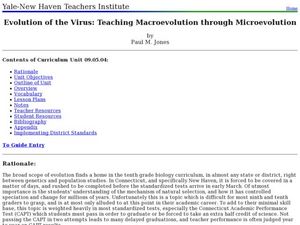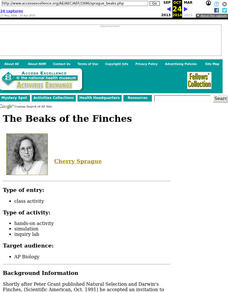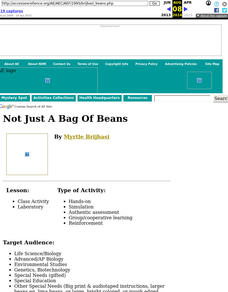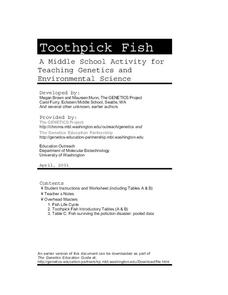Curated OER
Diving into Iceland's Genetic Pool
Investigate ethical issues surrounding the Decode project in Iceland. Middle and high schoolers take the positions of the Icelandic government, scientific researchers, and citizens and defend or refute the Decode project in a Reykjavik...
California Academy of Science
Color Vision Genetics Evolution Simulation
At one point, all mammals carried only two color receptors, but now most humans carry three. An informative presentation and hands-on activity demonstrate how this evolved through genetics. By participating in the activity, pupils...
National Geographic
Genetic Markers: Connecting the Dots
Biology buffs simulate how genetic markers are passed among populations in order to understand how these markers can help anthropologists map human migration. A couple of volunteers leave the room while you walk the remaining learners...
Curated OER
KORN-TV Newsroom
Role-play to learn. Writers pretend to be a team of news writers. They research information about genetically engineered corn and the impact of biotech food products. Then create a video, Powerpoint, or oral presentation to present their...
Howard Hughes Medical Institute
Got Lactase? The Co-Evolution of Genes and Culture
Does the human body evolve as quickly as human culture? With a stellar 15-minute video, explore the trait of lactose intolerance. Only about 1/3 of human adults seem to still have the enzyme lactase and therefore, the ability to digest...
Curated OER
Survivors on the Ocean Ridge
Students discover the uniqueness of deep sea hydrothermal vent organisms through an exploration of the NOAA Galapagos Rift Expedition. They study the genetics and evolution of a shrimp species that lives near the vents then they...
Curated OER
Evolution of the Virus: Teaching Macroevolution Through Microevolution
Students describe the anatomy of a virus. In this biology lesson, students compare and contrast the characteristics of bacteria and viruses. They discover the genetic adaptations of viruses over time.
Curated OER
Race and Genetics: An Integrated Approach
Students analyze racial issues related to the Human Genome Project. They participate in a mock symposium and write a reflection/position paper based on specific ethical principals.
Curated OER
Natural Selection in Protected And Unprotected Populations
Studnets compare how two elephant seal populations fare during successive generations. They participate in a simulation using a card game to look at the differences in two populations, one that is protected from mortality by human...
Curated OER
Genetics for a Grim Future
Students perform a role playing exercise set in the next century after a nuclear war that destroys most of the present civilization. Groups of students act as genetic technicians making difficult choices concerning survival in this grim...
Curated OER
Bears of Banff
Learners pretend they have just entered a national park. They imagine that the park borders are all impassable mountains, and students will play the role of grizzly bears. Learners list three things every animal needs to survive, in this...
Curated OER
The Beaks of the Finches
Young scholars become birds and are given "beak-types". After completing the simulation, students relate results to adaptations and natural selection. Extensions of the simulation allow for comparative results and include population...
Curated OER
A Whale of a Problem
Students evaluate the possible causes contributing to the decline of the killer whale population from a number of differing perspectives. They present their findings in a talk show format and in letters of advocacy regarding
Curated OER
Hardy-Weinberg Equilibrium
Students investigate how Hardy-Weinberg Equilibrium is established and what assumptions and conditions are necessary to reach Equilibrium. They model alleles using materials such as index cards, M & M's and goldfish.
Curated OER
Clipbirds
Students attempt to pick up various objects with a wide variety of beaks, including scissors, spoons, etc.
WK Kellogg Biological Station
Sounds of Selection
Do you want a creative and fun way to teach about natural selection? Hop to it by turning your middle school princes and princesses into frogs trying to catch as many bugs as possible in a Hungry Hungry Hippos style game. For high...
Curated OER
Hardy-Weinberg Equilibrium According to Hoyle:
Young scholars gain a feeling for the significance of the Hardy-Weinberg Equilibrium without using algebra but participating in an interactice game.
Curated OER
Not Just a Bag of Beans
Young scholars determine the types of natural selection and variation that exists in a population, using beans.
Curated OER
I Feel Renewed!
Students participate in a simulation of the equal and unequal distribution of the earth's renewable resources. They discuss renewable resources and how food resources can increase and decrease, participate in the simulation, and analyze...
Curated OER
The Selection and Variation in the Egyptian Origami Bird
Students participate in a contrived natural selection simulation in which they build and modify simple paper airplanes. They study divergent and convergent evolution and how it is isolated in sub-populations.
Curated OER
Alcohol Use, Abuse, and Alcoholism
Students examine influences contributing to alcohol use and abuse. They asses the genetic and environmental factors involved in alcoholism. They create a histogram for modeling alcohol use and calculate the results into percentages of...
Curated OER
Candy Dish Selection
High schoolers explore natural selection. They explore the concepts of adaptations, and the way which random factors affect the survival of individuals and populations.
Curated OER
Who Gets Eaten? A Study of Natural Selection
Fourth graders represent a new predator on a population of colored worms. They mathematically determine the effect of the new predator on the survival and reproductive rates of the worms, simulating natural selection at work.
University of Washington
Toothpick Fish
With colored toothpicks representing genes, youngsters practice passing them through generations of fish and learn about heredity. Consider this as an introductory activity since it does not represent recessive genes with lowercase...
Other popular searches
- Population Genetics 11 Grade
- Population Genetics Bunnies
- Population Genetics Lab
- Population Genetics Rabbit























